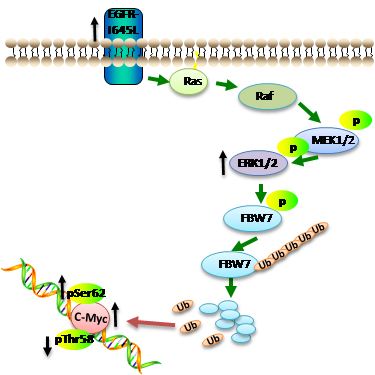Recently, Prof. LIU Yang's group at the Dalian Institute of Chemical Physics (DICP) of the Chinese Academy of Sciences revealed the molecular mechanisms of JQ1 resistance in hepatocellular carcinoma. This study could provide the theoretical basis for improving the clinical response to anti-cancer agent. Their findings were published in J Exp Clin Cancer Res.
Sorafenib and lenvatinib are currently the standard first-line drug approved by the Food and Drug Administration (FDA) for advanced hepatocellular carcinoma (HCC). However, these drugs only improve overall survival for 3 months of HCC patients and the tumor responses are generally poor. Therefore, it is urgent to develop a new novel therapeutic drug for HCC treatment.

EGFR -I645L mutant constitutively activates MEK/ERK signal to attenuate FBXW7 mediated C-MYC ubiquitination though regulating phosphorylation of p-MYC-ser62 site. (Image by YIN Yalei and WANG Ting)
It was reported that JQ1, which is a specific and competitive inhibitor of bromodomain-containing protein 4 (BRD4), inhibited expression of c-Myc and induced cellular apoptosis, suggesting its great potential in HCC clinical treatment. However, the molecular mechanism of the sensitivity of HCC to JQ1 has not been understood yet.
"We uncovered a novel activating EGFR mutation-I645L in JQ1-insensitive HCC cells by using whole exome-sequencing (WES)" said LIU. "This mutant could constitutively activate MAPK pathway, leading to phosphorylation of C-Myc at ser62 site and enhanced stability of oncogenic MYC protein in JQ1 resistant cells." LIU added. Furthermore, the combination of JQ1 with either EGFR or ERK inhibitors significantly enhanced the anti-tumor effect of JQ1 in vitro and in vivo.
This study suggests that EGFR or MAPK status might be considered ahead of JQ1 therapy and great therapeutic value for HCC treatment.
The research was supported by the National Key Research and Development Program of China, National Natural Science Foundation of China grants, Innovation program of science and research from the DICP, CAS. (Text by TIN Yalei and WANG Ting)